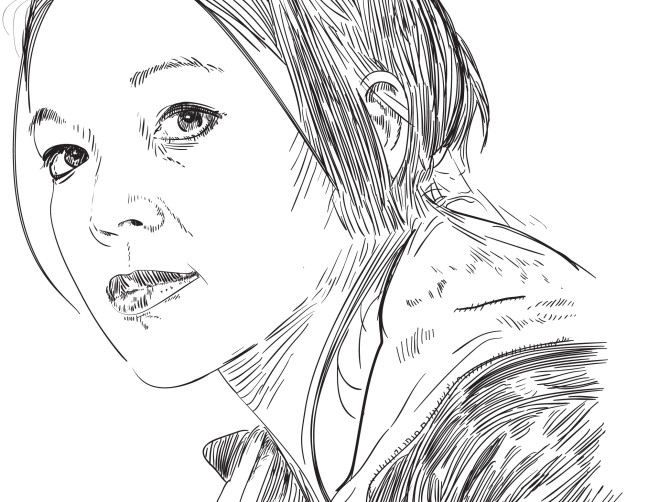The acclaimed playwright talks with us about dystopias, utopias, reproductive rights, and bi-racial horror stories.
The world that the play is set in is kind of a semi-dystopian society in terms of the deplorable state of reproductive rights; in opposition to that, what are some aspects that would be present in your utopian version of the near-future?
Ah, that’s a lovely question to start with.
With respect to reproductive rights, it would in the most general terms involve individuals being legally recognized as the authors of their own reproductive decisions, and having the information and resources to be empowered to plan for and make those decisions.
And then, beyond that—well, you know: universal health coverage, a real living wage as the minimum wage, gun control, incredible funding for the arts with the understanding that art in all its forms is a necessary and integral part of any functioning society, way more affordable housing in major cities and elsewhere (I’m looking at you, ny/sf/la), adequate maternity/paternity leave & childcare coverage, awesome & subsidized education at all levels of education, 24-hour public transportation in every city, protected national parks, sustainable energy, locally- & sustainably-farmed & -raised foods, enlightened immigration policy, gender and racial parity, a less binary socialization process…(this is clearly a long road to go down, as Utopias can take some time to envision; so I’ll pause there, for now).
Specifically theater-related, and since I read this recently, more productions of plays written by women/transgender & people of color. (Not sure if you’ve seen it, but The Count, a new study released last month, reveals that only 20% of plays produced each year in American theater are written by women, and only 3.4% by American women of color. So those are some sobering figures. http://www.dramatistsguild.com/media/PDFs/TheCount.pdf .)
I know you were going through the process of getting Lydia’s Funeral Video published for a number of years. How has your relationship with the material changed since the time that you originally wrote it?
It was roughly five years from our first discussion about publishing the book to the actual publication (and seven years after I first wrote and performed it). I expected I’d experience a greater sense of remove, but as I’ve gone back to the material (initially for edits, then for readings and performances), I’ve found that the play is still very much alive in me. I spent so much time with this story and these characters when I was first writing and performing it that I think they’re in my bones now.
I also have an entirely new relationship with Lydia’s Funeral Video, the book (as distinct from Lydia’s Funeral Video, the play), because of the elements that are (now) integral to the publication, that were not part of the original play (the counterpoint narrative, the illustrations, the notes, the afterword). Developing these elements for the book renewed my experience of the play and put it in a fresh context for me. So that changed my relationship to the material, as well.
Still, when I’m not actually performing it, I do see the piece at a distance. There are aspects of it that certainly feel like a product of that particular time (for me as a writer and performer, and for the actual time I was writing).
I expected and hoped, though, that the subject matter itself would feel more outdated (i.e., I hoped that in 2015 we wouldn’t be facing the kinds of attacks on reproductive rights that we’re currently facing in this country), but that aspect of it, upsettingly, seems to be very right now.
There’s a solid amount of good, old-fashioned abortion jokes in Lydia’s Funeral Video. Some people would probably take offense to these sections (and in the story’s pro-choice stance in general). Do you feel that the possibility of offending certain groups ever causes you to draw lines for yourself in your writing?
I do think about how an audience might respond, but I don’t draw lines for myself based on anticipated responses; I think, instead, I try to ask myself if what I’m doing is necessary to the piece, and not just writerly indulgence, or a way to get an easy laugh. The abortion jokes in Lydia’s Funeral Video feel central to the story and character; the jokes are a way for both Lydia and the show to wrestle with and talk about some of these questions.
Still, I do think we have a responsibility to the material, to the subject matter and communities we’re writing about; I think we need to always be aware of what we’re writing. That doesn’t mean “no abortion jokes”, but honoring the material as well as the play—approaching both with thoughtfulness and respect and honesty. (I struggle with this a lot; right now, for instance, I’m writing a play about women serving as gestational surrogates, and I’m constantly asking myself if what I’m writing is both recognizing/respecting the material and serving the play.)
The title of Lydia’s Funeral Video belies a certain indulgence in retro media (why isn’t it Lydia’s Funeral Vine?!). How would you imagine Lydia adapting her funeral video project to a form of modern media?
Ha—very true. Yeah, it’s even more super retro now than when I first wrote it, when Vine didn’t yet exist; the idea that in the future someone would use an actual video camera feels ludicrous from a 2015 perspective. I guess she’d record the video with a watch, or a google-glass-esque contact lens camera. And there’d probably be some accompanying 140-character twitter-of-the-future feed.
But she’d probably still do the longer takes, since my luddite mind and heart would probably break over a funeral video (or play) composed of 6-second clips & 140-character tweets. (Although I have no doubt that there are folks out there more at home in social media who would create fantastic vine- & twitter-like versions of Lydia’s Funeral Video).
For Kaya Press we have our #LitInColor campaign to support and bring attention to writers of color. Who are some of your favorite writers of color you enjoyed and were inspired by when you began writing?
When I was growing up, it was mostly novelists (maybe because novels gave me the longest and most in-depth, full-immersion blocks of escape time). The writers of color who immediately come to mind whose books I loved reading are Louise Erdrich, Toni Morrison, Gabriel García Márquez, Isabel Allende, Maxine Hong Kingston.
You speak a lot about bi-racial identity in your writing. In honor of this spooky Halloween season, do you have any ideas for a one sentence, bi-racial horror story?
I love this question, and also feel utterly at a loss as to how to answer it.
A writer tried and tried to write a story that would honestly, thoroughly, provocatively, and engagingly capture all aspects of her biracial experience, only to be confronted with the uncategorizable nature of being, and her own failure to honestly, thoroughly, provocatively, and engagingly capture it.


Leave a Comment
We'd love to know what you think.